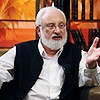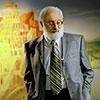Audio Version Of The Blog – 06.06.15
Listen to an Audio Version of the Blog
Download: MP3 Audio
[audio:http://files.kabbalahmedia.info/download/audio/eng_o_rav_2015-06-06_declamation_blog-rav_full.mp3 title=’6.6.15′]

Listen to an Audio Version of the Blog
Download: MP3 Audio
[audio:http://files.kabbalahmedia.info/download/audio/eng_o_rav_2015-06-06_declamation_blog-rav_full.mp3 title=’6.6.15′]
The Torah, Numbers 3:5 – 3:7: The Lord spoke to Moses saying: Bring forth the tribe of Levi and present them before Aaron the Cohen, that they may serve him. They shall keep his charge and the charge of the entire community before the Tent of Meeting, to perform the service of the Mishkan.
Question: From whom did the Levites have to guard the Tabernacle (Mishkan)?
Answer: Suppose I have a certain property that guards me from saying anything that I shouldn’t. Similarly, in spiritual work we cannot work with desires and attributes that are not corrected yet. We must understand that the right and the left lines must support each other because it seems to a person that he advances and that he wants to discover the attribute of love and bestowal, yearning to get closer to the Creator, but, in fact, we must examine this very carefully.
On the whole, the attributes of the right line that yearn to advance need the left line that restrains and beats them in order to recheck things more deeply, to compare them once more, to connect to others correctly, and to create an “safety cushion,” a special environment that supports this.
When a person becomes adapted to the new level, he yearns for that attribute of bestowal, but, when he enters this attribute, he loses his head and loses his self-control since he sees that it is all absolute love. He is immediately burnt like Nadav and Avihu, or he sins like Adam HaRishon.
The problem in attaining the spiritual attributes is that when you reach a certain attribute, you become that attribute, and everything completely changes in your mind. You don’t control your old self anymore, and therefore, in advance you must create a counterweight to the state in which you will be, your future state. This isn’t easy.
[159658]
From KabTV’s “Secrets of the Eternal Book” 12/31/14
Related Material:
Priests And Levites
The Basics Of Working In Three Lines
The Level Of The Sons
 In the News (postnauka.ru): “…The uniqueness of Maslow’s theory is that he treats each person in terms of a hierarchy (superordinate structures) of needs, the apex of which is the need for self-actualization. It defines self-actualization as a man’s desire for self-actualization, to actualize his potential. This desire to be what the person should be.
In the News (postnauka.ru): “…The uniqueness of Maslow’s theory is that he treats each person in terms of a hierarchy (superordinate structures) of needs, the apex of which is the need for self-actualization. It defines self-actualization as a man’s desire for self-actualization, to actualize his potential. This desire to be what the person should be.
“Moreover, as noted by Maslow, self-actualization is not determined by social roles, status, position. For example, one person self-actualizing as the perfect parent, and the other as an athlete, and the third as an artist, and so on. Nevertheless, a significant role in the development of personality Maslow assigns social environment.
“The basis of the pyramid of needs are physiological needs: the need for food, sleep, etc. Above these is built the need for security, stability, freedom from fear, anxiety and chaos, a need for social structure and order. Above the need for security, Maslow puts the need for belonging and love, and above it – the need for respect and recognition. The top of the pyramid, as has been said, is the need for self-actualization.
“One of the most frequently asked questions: Why is it a pyramid? Maslow believed that only individuals reach the top of the pyramid and become self-actualized, i.e., reach their identity or self. Most people operate on the level of satisfying their physiological needs. Part of humanity meets the physiological needs and security needs, that is, feeling well-fed, clothed and sheltered, the other part, except those needs, meets the need for love and belonging. Then there is this group of people, which reaches the level of acceptance, confidence, a sense of the importance of private utility.”
My Comment: Baal HaSulam’s pyramid is a pyramid of corporeal desire— food, sex, family— bodily desires, and the needs for wealth, honor, knowledge—social desires—next, above these desires is the desire to attain the meaning of life, the source of life, that appears in a person from Above in the form of a Reshimo, an informational gene of his previous spiritual state. The Reshimo leads a person to a teacher, a Kabbalist, and under his guidance and instruction one discovers the 125 levels of the spiritual attainment, until he reaches the top of the ladder, the state of the complete correction of the ego and the resemblance to the upper force.
[159668]
Related Material:
A Kaleidoscope Of Desires
Under The Authority Of Money
A Reality Given In Sensation
 Question: Do philanthropists have a soul?
Question: Do philanthropists have a soul?
Answer: Philanthropists do not have a soul, none of the common people do. About 10% of humanity have a natural inclination to be altruists and share with others. They receive pleasure from giving and do so.
Question: How do they differ from those who have attained their soul, i.e., those who truly bestow?
Answer: The soul is part of our desire to receive, to enjoy, which is corrected so that it bestows to others. Philanthropists have not corrected themselves and don’t have a soul. They fulfill the desire inherent in their ego—to receive pleasure from giving to others. However, this isn’t considered a desire to bestow. It is the same egoistic desire to receive and enjoy. After all, they behave that way since they feel pleasure in doing so.
[159558]
From Israeli Radio Program 103FM, 5/10/15
Related Material:
Who Has A Soul?
Once More About The Soul…
What Is The Soul?
 (Continued from “Revolution of the 21st Century: Rich Man, Poor Man”)
(Continued from “Revolution of the 21st Century: Rich Man, Poor Man”)
First of all, society should be viewed through the prism of its development “on the crest of” egoism, meaning the desire to enjoy, which is our nature. This desire is constantly growing, increasing in various forms and directions. As a consequence, the various historical stages alternate with each other, and we are witnessing their dynamics.
Once people were glad to be in slavery because it provided food and housing and they never dreamed of anything more. Later, slaves struggled with the once-coveted yoke, eager to become free people. Let it be more difficult, but the man could not remain in captivity. Thus, our desire to enjoy gradually undergoes internal transformations, changing the order of priorities.
In this way, freedom is not the final destination. Indeed, a person needs a job to support himself. And here he is again enslaved no longer as a slave but as a worker, not bound and free to move. Thus, by increasing both quantitatively and qualitatively, our egoism drives the changes in our lives.
[160147]
From KabTV’s “A New Life” 5/14/15
Related Material:
Boundless Limit of Egoism
How Can I Control The World?
Against The Egoistic Urge